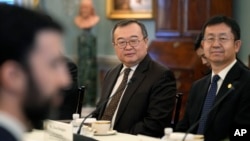Liu Jianchao, the senior diplomat widely expected to become China’s next foreign minister, said “the world needs connectivity, not decoupling,” during a four-day visit to Singapore.
Liu, who heads the international department of the Communist Party, was in the city-state to meet with Prime Minister Lee Hsien Loong and the country’s incoming leader, Deputy Prime Minister Lawrence Wong.
During a speech at the FutureChina Dialogue on Wednesday, local media reported that Liu warned of the need for “civilizations to engage, not to clash,” in the context of multiple ongoing global conflicts.
When discussing Washington’s relationship with Beijing, Liu said “the U.S. has not abandoned its policy to oppress and contain China.”
Many China watchers have been predicting that Liu will replace Foreign Minister Wang Yi as Beijing’s next top diplomat. Most expected that would happen during China’s top level political meetings, the Two Sessions, earlier this month, but no announcement or change was made. Wang was reappointed to the role of foreign minister last June after Qin Gang was suddenly dismissed less than a year into the job.
Liu leads the Communist Party department responsible for relations with foreign political parties. He took up the role in 2022 and has embarked on some high-profile engagements, including a meeting with U.S. Secretary of State Anthony Blinken in January.
His four-day visit to Singapore marks a return to familiar territory for the veteran diplomat.
“Liu has had a number of ambassadorial postings in Southeast Asia, including the Philippines and Indonesia. He is quite comfortable with the region,” said political scientist Joseph Liow of Singapore’s Nanyang Technological University.
Ties between China and Singapore continue to strengthen, with the pair upgrading bilateral relations in a joint statement last April calling for improved cooperation in trade, investment and commerce.
Foreign Minister Wang also visited the city-state last August before Singapore’s Deputy Prime Minister Wong embarked on a four-day trip to Beijing and Tianjin in December.
During that visit a mutual 30-day visa waiver for citizens of both countries was announced.
“Singapore and China relations are in a really good spot,” said Dylan Loh, a Chinese foreign policy expert at Nanyang Technological University.
“With the mutual visa waiver now in place, there is greater movement of people, ideas and capital and it could be catalytic for businesses and increased people-to-people exchange,” Loh told VOA.
Singapore’s Ministry of Foreign Affairs said both Liu and Lee “reiterated their shared commitment to continue expanding cooperation in traditional areas like trade and investments.”
The pair also discussed the importance of “working together to promote regional economic integration,” added the Ministry.
“Singapore has a robust diplomatic partnership with Beijing and is viewed as a trusted regional interlocutor,” said Hunter Marston, a researcher of Southeast Asia Studies at the Australian National University.
While relations seem to be flourishing, there have been a number of recent incidents involving the presence of China, and Chinese money, in Singapore.
In late February, a Hong Kong-born businessman with strong connections to China became the first person to be designated as a “politically significant person” under Singapore’s new foreign interference laws.
Singapore has also seen a flood of Chinese capital and companies in recent years, with political stability and business-friendly policies luring investment.
But last August, authorities uncovered the largest money laundering case in the country’s history, with local media reporting that more than $2.2 billion of assets have been seized or frozen.
Singapore’s Straits Times reported that the 10 men arrested in relation to the case all originate from Fujian Province in eastern China.
Despite the high-profile nature of these incidents, Liow believes they will have little bearing on talks between Liu and Singapore’s leaders.
“Countries will have differences, but it's important that they try to find common ground in order to foster deeper cooperation.
“Singapore is a very open economy,” he added. “So this question of Chinese money, or money from any other country coming to Singapore, it's not particularly surprising.”
Liu’s visit to Singapore comes amid increased tensions between China and the Philippines over territorial disputes in the South China Sea.
On Monday, the Philippines summoned Beijing’s envoy in Manila over alleged "aggressive actions" in the disputed waters. That followed an incident in early March involving a Philippines-flagged vessel colliding with a Chinese Coast Guard ship.
During a meeting between Liu and Singaporean Foreign Minister Vivian Balakrishnan, the pair “exchanged views on ASEAN-China relations, as well as other regional and international developments,” according to Singapore’s Foreign Ministry.
“It is very important for Singapore that the various claimant states [in the South China Sea] exercise restraint, and not allow their differences to cause tensions to escalate,” said Liow.




